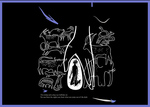
from May 18 to 19, 2017
http://www.documenta14.de/en/calendar/20376/black-athena-reloaded-1-ideas-as-migrants
Parko Eleftherias, Athens Municipality Arts Center and Museum of Anti-dictatorial and Democratic Resistance, Vassilissis Sofias, Athens
In 1987 Martin Bernal published
Black Athena: The Afroasiatic Roots of Classical Civilization
putting forward a controversial thesis that tried to delink Greek history from the western narratives that emerged after the XVII century, and reclaiming African and Asian roots of Greek civilization. These series of debates take Bernal’s title as an epistemic challenge in order to question the politically constructed distinctions between North and South, East and West.
This first debate gathers African philosopher Isaïe Nzeyimana, artist Christian Nyampeta and Ranabir Samaddar, director of the Calcutta Research Group, and The Apatride Society of the Political Others to speak about the impossibility for ideas to remain within “national” borders. At the end of the talks, a special gathering will take place with the Society of Friends of Ulises Carrión, at which the poet and musician Lena Platonos with Savina Yannatou and Stergios Tsirliagos perform few songs selected by Niki Giannari.
In cooperation with the Goethe Institute
Black Athena Reloaded 1: Ideas as Migrants
Our Common Ghosts
Conceived as a two-hours-long live audio-visual working session in which philosopher Isaïe Nzeyimana engages in a historical and philological reading of the notions of
ubuvandimwe
(communality) and
ubwenge
(intellection) and outlines the associations of these notions with “Greek” conceptions of communality and intellection. Nzeyimana elaborates from his forthcoming volume, and provides case studies from the social contexts of his recent writing, and from the work of his students at Nile Polytechnic of Applied Arts in Huye, Rwanda.
Christian Nyampeta starts with a “Greek” concept of idiorrhythmy, its historical development through the life practices of the ascetics, nuns and monks of the Egyptian deserts, and its location on Mount Athos—aspects of which last to this day. By focusing on a separate treatment of the terms
idios
and
rhuthmus
, a new horizon of idios-rhythm emerges: a generous and inhabitable hosting structure. Once it is thus renamed, this intellectual structure resonates with concepts of ubwenge and ubuvandimwe, and inyana (rhythm), understood historically within animist practices.
This engagement with deep histories may contribute to the displacement of the violent modernist and colonial claims that erase and deny history to complexities of endogenous life practices, their visions, inhabitations and constructions of their bodies, their home and the world; their communality; and their relevance to the present. This engagement may also be an opening of knowledge making and learning which may converse with “Athens”—itself a flow of social ruptures and cultural mixtures. In so doing, these readings de-centre the West’s claim of “Athens” as the only historical source for common concepts for imagining life. Rather, this engagement extends an invitation in habituating a sensitivity for the awakening of our common ghosts, in order to summon them for trial.
The talks will be held in French and English with simultaneous translation in Greek.
